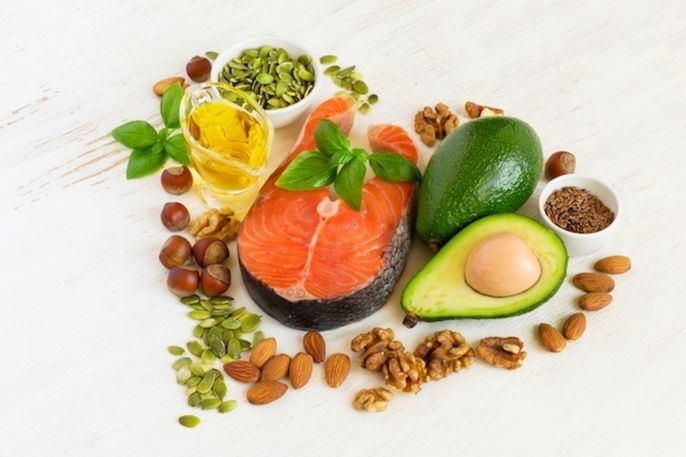A menopause diet can significantly impact how your symptoms are managed and can influence emotional and physical wellbeing. Women in menopause are advised in increase their intake of food that is rich in phytoestrogens, vitamin C, vitamin E, vitamin D, calcium, and omega-3. These nutrients can be obtained from nuts, grains, skim milk, white cheese and chickpeas, for example.
It is important to highlight that a menopause diet is best if oriented by a registered dietitian, who can indicate the best meal plan to reduce symptoms and reduce the risk for osteoporosis, metabolic changes and cardiovascular diseases.
In addition to maintaining a menopause diet, menopausal women should also exercise daily to reduce the intensity of related symptoms. Learn more about the most common menopause symptoms that women should monitor.

What to eat for menopause
Menopausal women should include food with the following nutrients into their diet to help prevent health problems that can emerge during this life phase:
1. Phyoestrogens
Phyoestrogens can be found in some foods, like soy, nuts, legumes and grains. The composition of phytoestrogen is very similar to estrogen produced by women, which is why these foods can relieve symptoms like night seats, irritability and hot flashes.
Food list: Flaxseeds, soy, sesame seeds, humus, garlic, alfalfa sprouts, pistachio, sunflower seeds, plums and almonds.
2. Vitamin C
Consuming vitamin C can help to strengthen the immune system and maintain healthy skin. This vitamin facilitates wound healing and permits collagen absorption in the body, which is a protein that is important for skin firmness, structure and elasticity.
Food list: kiwi, strawberries, orange, papaya, guava, melon and tangerine
3. Vitamin E
Vitamin E can help to improve skin health and prevent premature aging and wrinkles. It can also maintain hair integrity and keep the hair moisturized.
Due to its antioxidant action, vitamin E can also increase immunity, maintain heart health and prevent neurological diseases like Alzheimer's.
Food list: Sunflower seeds, peanuts, Brazilian nuts, walnuts, mango, seafood, avocado and olive oil.
4. Omega-3
Foods that are rich in omega-3 contain antioxidant and anti-inflammatory properties, making them great options for treating diseases like arthritis. They also help to keep the heart healthy, as these foods reduce LDL cholesterol and increase HDL cholesterol, and improve blood flow and blood pressure.
Food list: Tuna, salmon, seeds, flaxseeds, sardines and walnuts
5. Calcium and vitamin D
Calcium and vitamin D are nutrients that are essential for healthy teeth and bones. They can help to prevent the development of osteopenia or osteoporosis, which are illnesses that commonly occurring during or after menopause as a result of reduced estrogen levels.
Food list: Skim milk, Greek yogurt, white cheese, low-fat cheese, almonds, basil, watercress, flaxseeds and broccoli. Vitamin D rich foods include salmon. yogurt, sardines and oysters.
6. Fiber
Fiber is important for optimal intestinal function and to prevent problems like constipation. It can also be beneficial for managing cholesterol levels, blood sugar levels and appetite.
Food list: Fruits, vegetables, pumpkin, oats, wheat bran, beans, chickpeas, lentils, nuts, rice, pasta and whole wheat bread.
It is important that oats are not only high in fiber, but also contain phytomelanin. This can promote a good night's sleep and is generally indicated for women with insomnia.
7. Triptophan
It is normal for menopausal women to experience changes to mood, sadness or anxiety. This is why foods that are rich in tryptophan are recommended. Tryptophan is an essential amino acid that the body is unable to make. It is essential for the production of serotonin, melatonin and niacin, which can improve mood and wellbeing.
Food list: banana, broccoli, walnuts, chestnuts and almonds
Menopause meal plan
The following table outlines a 3-day meal plan that can help to complement the treatment of menopause symptoms:
The quantities outlined in this meal plan may vary depending on your age, activity level and health history. Ideally, you should see a registered dietitian to determine an adequate meal plan that meets your health needs.
What to avoid
There are some foods that should be avoided or consumed in moderation during menopause, as they can lead to excessive fat accumulation in the belly. Some of these foods include:
- Overly-seasoned foods
- Excess red meat
- Alcohol
- Sausages
- Fried food
- Canned food
- Premade sauces
- Fast food
- Processed foods in general
Milk and dairy products should be skim or low-fat options. Caffeinated drinks, like hot chocolate, coffee and black tea, can interfere with calcium absorption and contain a stimulant action, which can make sleep more difficult.






























